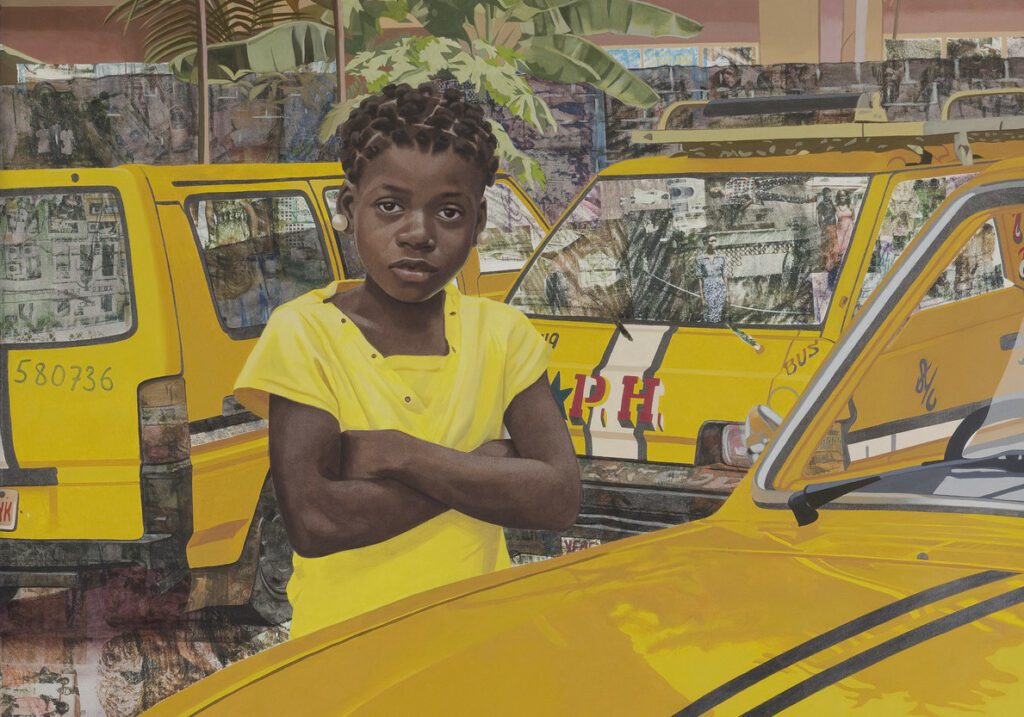Victoria Miro, Venise, Italy
08 May 2019 - 13 Jul 2019

Njideka Akunyili Crosby “The Beautyful Ones” (detail) Series #7, 2018. Acrylic, colour pencil and transfer on paper, 152.1 x 108 cm. © Njideka Akunyili Crosby. Courtesy the artist, Victoria Miro, and David Zwirner.
Victoria Miro presents the most recent works from Los Angeles-based artist Njideka Akunyili Crosby’s acclaimed series “The Beautyful Ones”.
Begun in 2014, Njideka Akunyili Crosby’s ongoing series “The Beautyful Ones” is comprised of portraits of Nigerian children, including members of the artist’s family, derived from personal photographs and, more recently, from images taken during her frequent visits to Nigeria, where Akunyili Crosby lived until the age of 16. Its title is taken from the 1968 novel by the Ghanaian writer Ayi Kwei Armah, The Beautyful Ones Are Not Yet Born, a book whose influence endured during the artist’s adolescence in the 1990s and is still felt today. In it, the author laments the lost idealism of a generation in the 1960s for a better Africa, post-independence. In “The Beautyful Ones”, Akunyili Crosby reinstates this optimism in her own and subsequent generations while offering a powerful perspective on the complexities of a contemporary diasporic experience.
Works on view include “The Beautyful Ones” Series #8, 2018, a portrait of a young boy who, wearing a traditional agbada tunic and a serious expression, stands in a living room in front of a stack of stereo equipment. A sound system appears again in “The Beautyful Ones” #9, 2018, a work that depicts three children, this time less formally posed, in a domestic interior that also includes a television, photographs and books. “The Beautyful Ones” Series #6, 2018 is a work based on a found image of a girl who, wearing a school uniform of a pinafore dress and checked shirt, stands amid the desks of an empty classroom. These interior images contrast with the street scene depicted in “The Beautyful Ones” Series #7, 2018, which shows a girl, arms folded, her eyes confidently meeting the viewer’s gaze, her bright yellow T-shirt echoing the vivid hue of the taxis that surround her.
In each of these apparently everyday scenes, precise in style, crystalline in appearance, certain details draw our attention to the multifaceted character of Akunyili Crosby’s subjects: the bright tote bag with which the schoolgirl has accessorised her outfit; the outsized earrings and buttoned vest of the confident T-shirt wearing girl. Other details—a hairstyle, or the heft of an old-school hi-fi, for example—scramble a sense of time. Is this now, or the 1980s? Whose childhood are we witnessing? These details, in turn, draw us into a second wave of imagery, only truly discernible close-up. Applied using an acetone transfer technique are photographic images derived from sources including Nigerian politics and pop culture. There are references to the country’s colonial past, and to stories that appear in our newsfeeds today. Along with more personal imagery, they pervade the composition, as music might from the stereos Akunyili Crosby depicts, pulsing rhythmically across the picture plane, first as background notes then as bright accents.
It is partly through this labour-intensive process that Akunyili Crosby addresses the idea of cultural overlap and the complex layering of influences—personal, cultural, historical and political—on people, even those such as “The Beautyful Ones”, whose age might suggest characters and histories as yet unwritten. In this, the work resonates strongly with the western tradition of childhood portraiture, whose evolution across the centuries is broadly in line with the shifting status, and often precarious reality, of childhood itself. While portraiture is always to some degree an act of commemoration, to capture and preserve the image of a child necessitates a degree of projection and reflection—of hopes, fears, innocence or its loss—on behalf of the artist and viewer alike. The pleasures of childhood are necessarily seen through the prism of adulthood, through its own pleasures, or anxieties of which the children depicted may well remain blissfully unaware. Akunyili Crosby renders these in her complex layers. They are images of childhood freighted with adult experience.
.